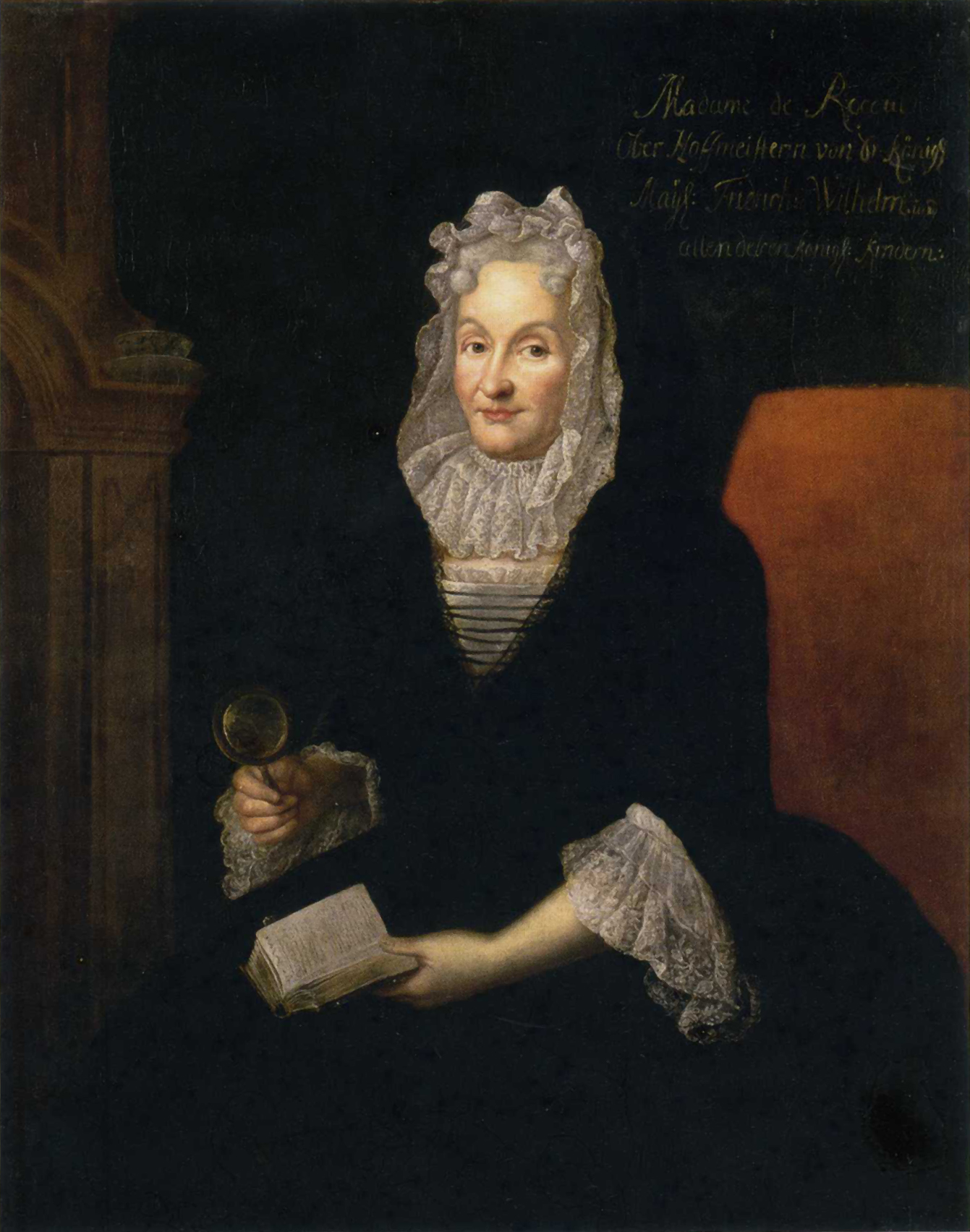Marthe de Roucoulle on:
[Wikipedia]
[Google]
[Amazon]
 Marthe de Roucoulle or ''de Rocoulle'' (1659–1741) was a French
Marthe de Roucoulle or ''de Rocoulle'' (1659–1741) was a French
 Marthe de Roucoulle or ''de Rocoulle'' (1659–1741) was a French
Marthe de Roucoulle or ''de Rocoulle'' (1659–1741) was a French Huguenot
The Huguenots ( , also , ) were a religious group of French Protestants who held to the Reformed, or Calvinist, tradition of Protestantism. The term, which may be derived from the name of a Swiss political leader, the Genevan burgomaster Be ...
educator and ''salonnaire'' active in Prussia. She was the governess
A governess is a largely obsolete term for a woman employed as a private tutor, who teaches and trains a child or children in their home. A governess often lives in the same residence as the children she is teaching. In contrast to a nanny, th ...
first of Frederick William I of Prussia
Frederick William I (german: Friedrich Wilhelm I.; 14 August 1688 – 31 May 1740), known as the "Soldier King" (german: Soldatenkönig), was King in Prussia and Elector of Brandenburg from 1713 until his death in 1740, as well as Prince of Neuch ...
and later of his son Frederick the Great
Frederick II (german: Friedrich II.; 24 January 171217 August 1786) was King in Prussia from 1740 until 1772, and King of Prussia from 1772 until his death in 1786. His most significant accomplishments include his military successes in the Sil ...
.Life
Marthe de Roucoulle was originally fromNormandy
Normandy (; french: link=no, Normandie ; nrf, Normaundie, Nouormandie ; from Old French , plural of ''Normant'', originally from the word for "northman" in several Scandinavian languages) is a geographical and cultural region in Northwestern ...
in France, reportedly "of gentle blood, never very rich". She was Protestant and belonged to those French Huguenots who chose to flee France for Prussia after the revocation of the Edict of Nantes
The Edict of Nantes () was signed in April 1598 by King Henry IV and granted the Calvinist Protestants of France, also known as Huguenots, substantial rights in the nation, which was in essence completely Catholic. In the edict, Henry aimed pr ...
. She arrived in Prussia as a penniless widow under the name Marthe de Montbail with her mother-in-law and her daughter and namesake. She was received at the Prussian court by the future Queen Sophie Charlotte, who liked her company and found her suitable as governess for her son because of her intelligence and good manners.Governess to Frederick William I
She was appointed governess to the future Frederick William I after his return from Hanover in 1692. As she never learned to speak proper German, the German of the monarch was affected by French words. She eventually married another French Huguenot, Roucoulle, who served as an officer in the Prussian army, which was quite common for male Huguenots in Prussia.Governess to Frederick the Great
In 1712, the widowed Roucoulle was appointed governess to the future Frederick the Great by her former charge, king Frederick William I, and remained in this position for the first seven years of his life. His head governess was Frau von Kamecke "Kamken", but her position was but formal and the actual work was done by her ''sous gouvernante'', Marthe de Roucoulle, in turn superior to the nurses and sub-governesses, many of whom too were French Huguenots. Frederick called her "Chère Maman", and had a noted good relationship with her. In 1714, she was also appointed governess in charge of the royal princesses. Marthe de Roucoulle retired as the governess of the crown prince after he reached the age of seven, but continued as governess to the royal princesses, among them his sister,Louisa Ulrika of Prussia
Louisa Ulrika of Prussia ( sv, Lovisa Ulrika; german: Luise Ulrike) (24 July 1720 – 16 July 1782) was Queen of Sweden from 1751 to 1771 as the wife of King Adolf Frederick. She was queen mother during the reign of King Gustav III.
Backgr ...
, future queen of Sweden: her daughter Marthe de Montbail was made '' hofmeisterin'' in 1734. She also enjoyed society, and hosted a weekly soirée in which the Prussian nobility mingled with the French Huguenot community in exile.Later life
She kept in contact with her former charge Frederick the Great, and had a good relationship with him also after he became an adult. He made a point of treating her with respect and gratitude, made her several favors and always visited her salon, the Roucoulles Soirée, once a week whenever he was inBerlin
Berlin ( , ) is the capital and largest city of Germany by both area and population. Its 3.7 million inhabitants make it the European Union's most populous city, according to population within city limits. One of Germany's sixteen constitue ...
, during which it was noted how well he behaved.Thomas Carlyle: History of Friedrich II of Prussia: Called Frederick the Great, 1870 He also provided her daughter with a pension.
Marthe de Roucoulle is described in the memoirs of Princess Wilhelmina.
References
* Thomas Carlyle: History of Friedrich II of Prussia: Called Frederick the Great, 1870 * Elizabeth Harriot Hudson, The Life and Times of Louisa, Queen of Prussia, volume 1 {{DEFAULTSORT:Roucoulle, Marthe de 1659 births 1741 deaths Huguenots German courtiers 17th-century German educators 18th-century German educators 18th-century Prussian people German salon-holders Governesses to the Prussian court 18th-century Prussian women French governesses French emigrants to Prussia